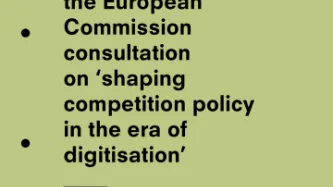Advanced Search
Content Type: Long Read
An edited version of this article was originally published on the EDRi website in September 2020.
Introduction
Monopolies, mergers and acquisitions, anti-trust laws. These may seem like tangential or irrelevant issues for privacy and digital rights organisations. But having run our first public petition opposing a big tech merger, we wanted to set out why we think this is an important frontier for people's rights across Europe and indeed across the world.
In June, Google notified the…
Content Type: Advocacy
Introduction
In February 2020, the Australian Competition and Consumer Commission (ACCC) commenced an investigation into the proposed acquisition of Fitbit by Google, which was originally announced in November 2019.
In March 2020, we made a submission to the ACCC, arguing that the acquisition would very likely have onerous implications for both consumers and markets. We asked the Australian regulator to apply strict scrutiny and not let hisory once again repeat itself. We concluded that the…
Content Type: Call to Action
Google wants to know everything about you.
It already holds a massive trove of data about you, but by announcing its plans to acquire the health and fitness tracker company Fitbit, it now clearly wants to get its hands on your health too. We don’t think any company should be allowed to accumulate this much intimate information about you. This is why we’re trying to stop its merger with Fitbit.
Google and Fitbit need the European Commission’s approval before they can merge. The merger would…
Content Type: Advocacy
For a long but fun analysis of the current competition and data state of play in the UK, click here.
Background
PI broadly welcomes the CMA’s interim findings, many of which correspond with issues of longstanding concern to PI and with the points raised in our response to the CMA’s Statement of Scope.
This includes the indication that Google and Facebook have a dominant or strategic position in major elements of the digital advertising market which can -at least, partially- be attributed to the…
Content Type: Advocacy
Background
In February 2020, the Australian Competition and Consumer Commission (ACCC) commenced an investigation into the proposed acquisition of Fitbit by Google, which was originally announced in November 2019.
Google, whose parent company, Alphabet, in 2018, generated 85% of its $136.22 billion in revenue from delivering targeted advertisements, has a past of competition law infringements in the European Union. Fitbit is a company that produces and sells health tracking technologies and…
Content Type: Advocacy
Today, we have responded to the UK Competition and Markets Authority’s online platforms and digital advertising market study
In the last year, Privacy International has conducted research into the ad tech and the data brokers industry exposing and complaining about their exploitation of personal data and the lack of transparency of their activities.
Based on our research and analysis of the current trends, Privacy International provided observations on the three broad potential sources of…
Content Type: Advocacy
Privacy International and Open Rights Group welcome the Competition and Market Authority (CMA)’s call for information on digital mergers. In this submission, the organisations provide their observations on some of the questions raised in this consultation, focussing on: the ways in which digital products or services are monetized though user data and advertising; questioning the assumption that users pay products or services with personal data; providing examples of…
Content Type: Advocacy
Consumers benefit from the existence of competitive markets, in which they can freely choose among a wide range of products and services. Competition policy plays an important role in this regard by ensuring that competition is not disrupted in a way that can harm consumers directly (e.g. leading to price increases or less choice) or indirectly (e.g. weakening competition as a process by hampering the ability of firms to compete on the merits).
Content Type: Advocacy
Privacy International encourages the European Commission to consider ways to reform or at least re-interpret competition regulation to address the data protection implications and the broader societal challenges posed by the exploitation of data by big corporations. This includes, for example, systematic consideration of data protection issues (including though consultation with relevant data protection authorities and organisations protecting privacy and consumer rights) when assessing mergers…








